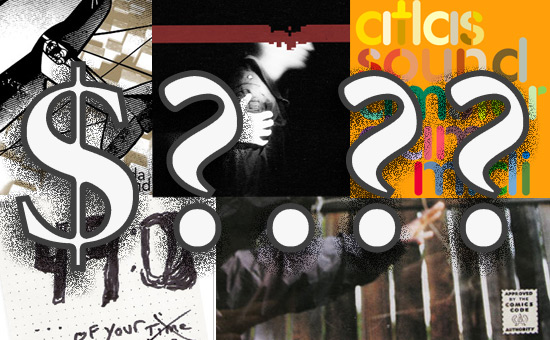
by Matt Slaybaugh
You paid $1.00 for In Rainbows in the first hour the file was available, you’ve pulled every hot mess from The Hood Internet, and you were there when Trent Reznor and Saul Williams released Niggy Tardust. Nicely done and what now, right?
Lucky for all of us, a great number of artists are taking inspiration from Radiohead and Reznor’s experiments in digital music distribution. That includes Reznor himself, who continues to release his new Nine Inch Nails albums online for prices ranging from free to $300. It seems to be working out pretty well for Trent. On his latest, The Slip, he seems to be having more fun than he has in years. That particular album is available on the NIN website for free. (If you prefer to drop $10, visit the iTunes store.) The higher-priced albums are hot too. Ghosts I-IV, a 36-track instrumental album, is available as a $5 high-quality download that includes a 40-page PDF, or as a $10 two-CD set. Nevertheless, Reznor sold every one of the 2500 Ultra-Deluxe $300 packages.
In the Agit homebase of Columbus, Miranda Sound went the Radiohead route, making their new (and last) self-titled album available for whatever price you wish pay to the Sunken Treasure Records’ digital download store. A similar plan may in fact be a legal necessity for mix master Girl Talk, whose newest record, Feed the Animals, is ready to be downloaded from Illegal Art.net, though physical CDs won’t be released until next month. Again, pay-what-you-want is the rule of the day.
The Walkmen have a new album coming out next week. Why wait, though, when you can get it for just $5 right now from ArnieStreet.com? In a press release, the band writes, “All donations go to Memorial Sloan-Kettering Cancer Center in honor of Luca Vasallo, a friend to the band and a current patient who is seven months-old and doing a great job fighting a very difficult disease. This is a very good organization that certainly deserves the attention.” Sounds like everyone wins on that one.
Of course, this type of cutting-edge, progressive behavior is kind of what expect from people like Trent Reznor, post-modern deejays and cool indie bands. But who expected it from Grandpaboy himself, Paul Westerberg? The release of his latest, 49:00, has been a strange saga. On July 21, Westerberg posted on his blog that the album was available from the Amazon music store for a measly 49 cents. The album itself is odd, it’s a single track featuring a number of songs in sequence, occasionally interrupted before their ends by what sounds like someone flipping through radio stations. It’s as if you’ve got an old hi-fi and every station is playing a pretty good Paul Westerberg song you’ve never heard before. However, on August 2nd, the jig was up, Amazon disabled the buying process and later removed the track completely. As of this writing, Westerberg still doesn’t know what happened. He did, however, let Amazon put out 5:05, a single song that you could purchase for $5.05 or 99 cents. However, it appears that Amazon has pulled this track as well. Could it be that somebody has Amazon scared?
Another frequent offender of the music industry is Bradford Cox, frontman for Deerhunter. On Cox’s blog, he frequently posts demos of new Deerhunter songs, as well as entire EPs of material from his solo project, Atlas Sound. For Atlas Sound, in fact, Cox has released as much music for free as he has through his label. Not content with pushing himself in new professional directions, Cox pushed his label to release Deerhunter’s much-anticipated new album online months ahead of its official street date. This doesn’t do a lot of us any good, however, since it’s still not available in the U.S. or Canada.
For artists, there are clear benefits to this sort of digital distribution model. For those who aren’t simply giving their music away, the path between their pockets and your wallet is a lot more clear of interference. Releasing music when and where they want, and with incredibly low overhead, also provides a great deal of artistic freedom; that certainly seems to be true in Cox’s and Westerberg’s cases. Working this way allows them to play. In MadLib’s case, it allowed him to release an online-only, entirely different version of the critically acclaimed Madvillainy album. It’s titled Madvillainy 2: The Madlib Remix, but plays much more like a complete second take than a remix. Direct-from-the-artist downloads also make good sense marketing-wise, since artists can continue to stay in contact with their fans in between major, label-promoted releases. The internet allows for easy interaction, and there’s much that fans and artists alike can gain from such online confrontations.
Digital downloads are so much the rage right now that labels and even publications are getting in on it as well. The Bleep store has been operating for a couple of years, offering high bitrate tracks and albums from more than 100 labels, including Warp, XL Recordings and Rough Trade. Labels like Merge, 4AD and Touch & Go are all operating their own comprehensive online shops, and Wax Poetics has an impressive online offering that features more 6,000 artists. So it’s easier than ever to get good music, at reasonable prices, almost instantly. It’s hard to see how that could be anything but beneficial for artists and audiences alike.
Joe Strummer: The Future Is Unwritten
An Agit Writer at the Pitchfork Festival
Daft Punk's Electroma
R.I.P. Noel Sayre
Heavy Metal in Baghdad
The Agit Report from Terrastock 7
News: Lollapalooza, Patti Smith Film, and Apples in Stereo and Son, Ambulance Tours
News: New Walkmen Album, InterZune, and Yeah Yeah Yeahs Recording
